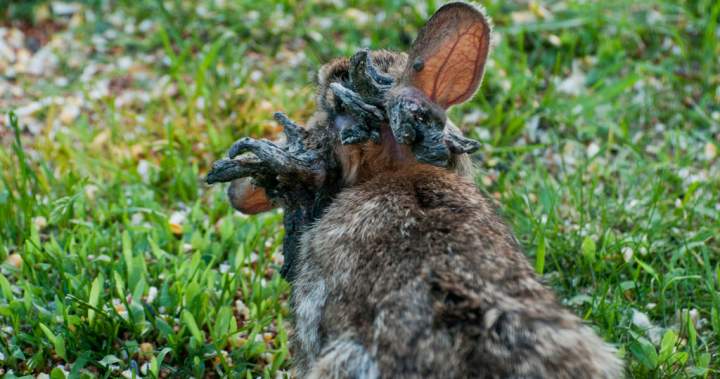Descrease article font size
Increase article font size
Rabbits have been spotted hopping around a Colorado town with unusual horn-like growths poking out of their heads, causing alarm among some locals.

The bunnies seen in Fort Collins, a town about 105 kilometres north of Denver, are infected with the somewhat common Shope papillomavirus, which causes wart-like tumours that metastasize from their faces, appearing like horns.
Rabbit with the papilloma virus (CRPV), or Shope papilloma virus. It infects rabbits, causing keratinous carcinomas, typically on or near the animal’s head.
Education Images/ Getty Images
Photos shared online of the infected Cottontails have led to the species being given some unfortunate epithets, including “Frankenstein bunnies,” “demon rabbits” and “zombie rabbits.” However, their disease is well known to scientists and has been extensively studied.
Story continues below advertisement
Kara Van Hoose, a spokesperson for Colorado Parks and Wildlife, told the Associated Press on Wednesday that the agency had received reports of sightings in Fort Collins.

Get daily National news
Get the day’s top news, political, economic, and current affairs headlines, delivered to your inbox once a day.
She assured that it is not out of the ordinary to see infected rabbits, especially during the summer months when fleas and ticks, which spread the virus, are most prevalent, adding that there is no risk to humans as the virus is only transmitted between rabbits.
The growths often look like warts but can appear more like horns if they grow longer, Van Hoose explained, assuring that they are harmless to rabbits unless they grow on their eyes or mouths and interfere with eating.
More on World
More videos
Rabbits’ immune systems can fight the virus and, once they do, the growths will disappear, she said.
Trending Now

Trump and Putin make ‘great progress’ in Alaska, but no Ukraine ceasefire

N.S. missing kids: Signs about Lilly and Jack Sullivan pop up as case remains unsolved
The virus was named after Dr. Richard E. Shope, a professor at The Rockefeller University who discovered the disease in Cottontails in the 1930s.
Infected rabbits’ appearance is said to have influenced the centuries-old jackalope myth in North America, which told of a rabbit with antlers or horns, among other animal variations.
The disease in rabbits also contributed to scientists’ knowledge about the connection between viruses and cancer, such as the human papillomavirus that causes cervical cancer.
— with files from The Associated Press
Story continues below advertisement

2:01
Selkirk, Man. tackles adorable but concerning bunny problem
Previous Video
Next Video
© 2025 Global News, a division of Corus Entertainment Inc.

